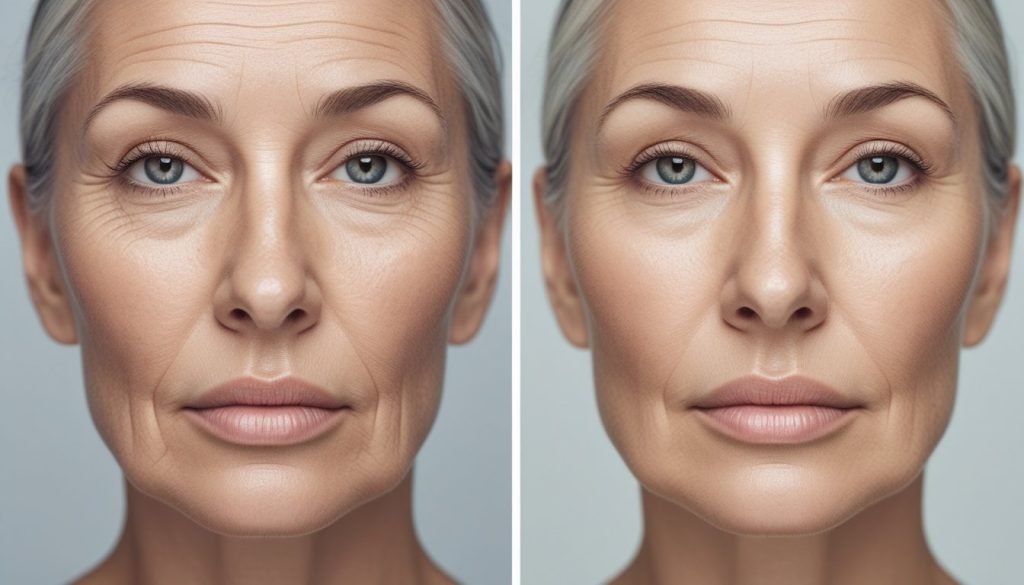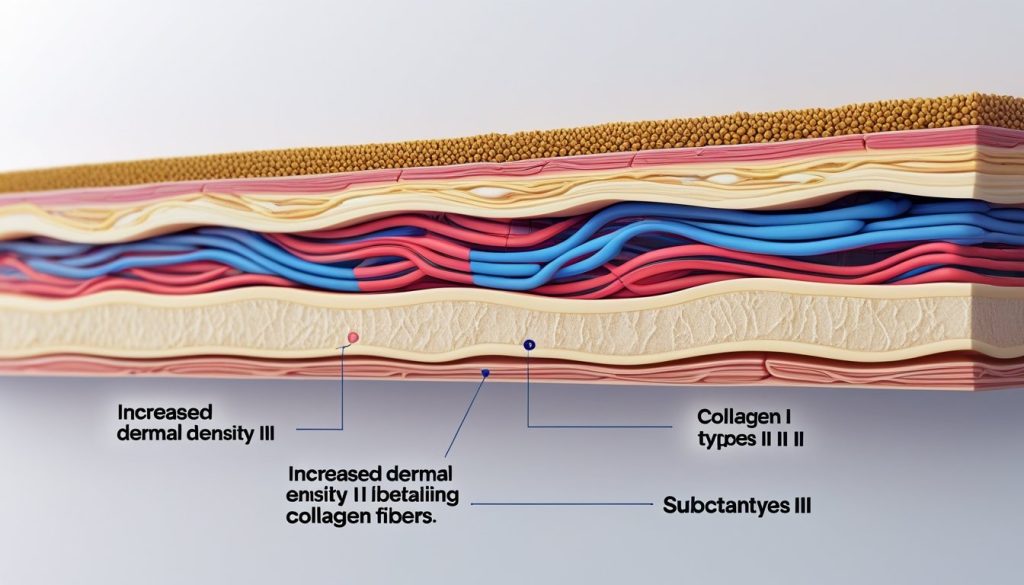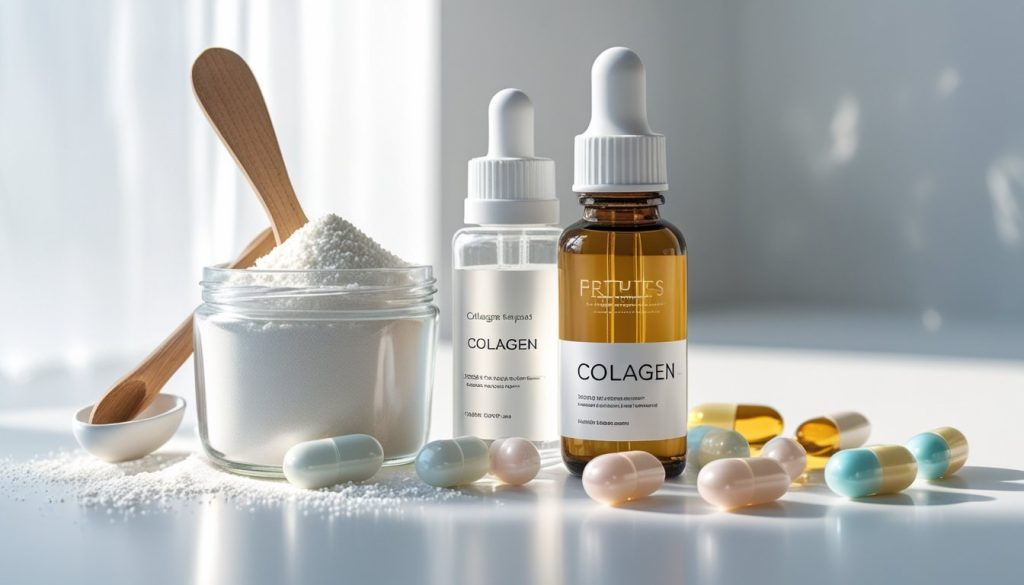Collagen I and III are two of the most crucial proteins for maintaining youthful, healthy skin, with emerging research revealing their remarkable potential to combat signs of aging and enhance overall skin quality.
These essential structural proteins work synergistically to provide the foundation for skin elasticity, hydration, and resilience against environmental damage.
Recent scientific studies demonstrate that supplementation with these specific collagen types can deliver measurable improvements in skin appearance within just weeks of consistent use, making them increasingly valuable in both clinical dermatology and cosmetic applications.
Understanding Collagen Types I and III: The Foundation of Healthy Skin
What Makes Collagen I and III Essential for Skin Health
Collagen is the most abundant protein in the human body, accounting for approximately 30% of the total protein content. Among the 28 different types of collagen identified in human tissue, Types I and III stand out as the primary structural components of healthy skin9.
Type I collagen constitutes approximately 90% of the collagen present in the skin, bones, and connective tissues, providing fundamental strength and structural support. This fibrous protein acts as the skin's primary scaffolding, maintaining firmness and preventing sagging.
Type III collagen works in close partnership with Type I, particularly during the early stages of wound healing and tissue repair3. This Type of collagen is especially abundant in the skin, blood vessels, and internal organs, contributing significantly to skin elasticity and suppleness. The synergistic relationship between these two collagen types creates the optimal environment for maintaining youthful skin appearance and function.
The Science Behind Collagen Production and Aging
Natural collagen production begins to decline as early as our twenties, with women experiencing particularly significant reductions after menopause2. This age-related decrease results in visible signs of aging, including wrinkles, reduced elasticity, and a decrease in skin thickness.
Research indicates that the ratio of Type I to Type III collagen shifts with age, with Type III collagen becoming increasingly dominant over time. 17 This shift affects not only skin elasticity and mechanical strength but also determines the fibril diameter and overall skin structure17.
The molecular composition of collagen involves specific amino acids, primarily proline, glycine, and hydroxyproline, which group together to form protein fibrils in a triple helix structure.
This unique configuration requires adequate amounts of vitamin C, zinc, copper, and manganese for proper formation.
Understanding this biochemical foundation helps explain why certain supplements and topical treatments can effectively support collagen synthesis and skin health.

Seven Evidence-Based Benefits of Collagen I and III for Skin Health
Benefit 1: Enhanced Skin Elasticity and Firmness
Clinical studies consistently demonstrate that supplementation with collagen I and III significantly improves skin elasticity and firmness.
A comprehensive meta-analysis of 19 studies involving 1,125 participants found that hydrolyzed collagen supplementation for 90 days was effective in improving skin elasticity compared to placebo groups.
The mechanism behind this improvement involves stimulating fibroblast activity, which increases the production of new collagen fibers within the dermal matrix.
Research using bovine-derived bioactive collagen peptides has shown measurable improvements in skin elasticity within just four weeks of supplementation. 20
These findings suggest that the bioactive peptides derived from collagen hydrolysis can effectively signal skin cells to increase their natural collagen production processes.
The enhanced elasticity translates to more resilient skin that better withstands daily environmental stressors and maintains its youthful bounce.
Benefit 2: Superior Hydration and Moisture Retention
Collagen I and III play crucial roles in maintaining optimal skin hydration levels through multiple mechanisms.
Studies evaluating low-molecular-weight collagen peptides demonstrated significant improvements in skin moisture content at various depths of the stratum corneum18.
Participants showed enhanced hydration at both 0.1 mm and 0.5 mm depths, indicating that collagen supplementation affects multiple layers of skin tissue.
The hydration benefits extend beyond surface-level improvements, with research showing that collagen peptides help regulate the expression of hyaluronic acid synthases and ceramide synthase19.
These enzymes are critical for maintaining the skin's natural moisture barrier and preventing transepidermal water loss. Additionally, collagen supplementation increases sphingomyelin levels, which contribute to improved skin barrier function and sustained hydration19.
Benefit 3: Reduction in Wrinkles and Fine Lines
One of the most visually apparent benefits of collagen I and III supplementation is the reduction in wrinkles and fine lines.
Clinical trials measuring eye wrinkle volume found significant reductions within four weeks of collagen peptide supplementation, with even more pronounced improvements after eight weeks 20.
These changes result from increased collagen synthesis in the dermal layer, which fills in fine lines and creates a smoother skin surface.
The anti-wrinkle effects are particularly notable around the eyes, where the skin is thinner and more susceptible to signs of aging.
Research using fish-derived collagen peptides has demonstrated improvements in wrinkle formation by regulating matrix metalloproteinase (MMP) pathways. 19 MMPs are enzymes that break down collagen; therefore, their regulation helps preserve existing collagen while promoting new collagen synthesis.

Benefit 4: Accelerated Wound Healing and Skin Repair
Collagen I and III are fundamental to the wound healing process, with Type III being particularly abundant during the early stages of tissue repair3.
Clinical research demonstrates that collagen supplementation can accelerate the skin's natural healing processes by providing the necessary building blocks for new tissue formation.
This benefit extends beyond minor cuts and scrapes to include the repair of UV damage and other forms of environmental skin stress.
Studies show that collagen peptides stimulate fibroblast proliferation and enhance the expression of genes involved in tissue repair13.
The polyphenolic compound equol, when combined with collagen, significantly increases the percentage of cycling fibroblasts, indicating enhanced cellular renewal and repair capacity. 13 This accelerated healing translates to faster recovery from skin damage and improved overall skin resilience.
Benefit 5: Protection Against UV-Induced Damage
Recent research reveals that collagen I and III supplementation can provide significant protection against ultraviolet radiation damage.
A study examining the combination of rosemary and grapefruit extracts found that these compounds significantly attenuated UV-induced reductions in procollagen I and elastin, while also lowering the secretion of harmful metalloproteinases.
The botanical blend reduced reactive oxygen species and pro-inflammatory interleukins, demonstrating comprehensive photoprotective effects.
Amino acid complexes have also shown promise in UV protection, with research demonstrating that specific formulations can prevent UV-induced decreases in collagen I synthesis15.
These protective effects include reduced inflammatory markers, decreased histamine response, and improved overall skin recovery following UV exposure. 15
The combination of internal collagen support and external UV protection creates a comprehensive approach to preventing photoaging.
Benefit 6: Improved Dermal Density and Skin Thickness
Collagen supplementation contributes to increased dermal density and skin thickness, creating a more youthful and robust skin structure. Studies using low-molecular-weight collagen peptides have shown significant improvements in dermal density within four weeks of supplementation. 18
These changes reflect increased collagen deposition in the dermal matrix, resulting in thicker, more substantial skin tissue.
The improvements in dermal density correlate with enhanced facial lifting effects, suggesting that increased collagen content provides better structural support for facial contours18.
Research using vitamin C-squalene bioconjugates has demonstrated significant increases in epidermal thickness and a preferential promotion of collagen III production. 7
These findings indicate that both topical and oral approaches can effectively enhance skin thickness and density.

Benefit 7: Anti-Inflammatory and Antioxidant Effects
Collagen I and III supplementation offers significant anti-inflammatory and antioxidant benefits, supporting overall skin health.
Research demonstrates that collagen peptides can reduce pro-inflammatory cytokines such as tumor necrosis factor-α, interleukin-1β, and interleukin-619. These reductions help calm skin inflammation and prevent the breakdown of existing collagen structures.
The antioxidant effects of collagen supplementation help combat oxidative stress caused by environmental factors, including UV radiation and pollution.
Studies show improved antioxidant enzyme activities and reduced protein expression of pro-inflammatory factors. 19
Additionally, specific collagen formulations help regulate the NF-κB pathway, a key inflammatory signaling mechanism that influences skin aging and damage 19.
Maximizing Collagen I and III Benefits: Application and Dosage
Optimal Supplementation Strategies
Research indicates that effective collagen supplementation typically requires consistent daily intake over extended periods.
Most successful studies used dosages ranging from 2.5 to 10 grams of hydrolyzed collagen peptides daily51820. The hydrolyzed form appears to be more effective because it contains smaller peptides that are more easily absorbed and utilized by the body.
Low-molecular-weight collagen peptides show particular promise, with studies demonstrating that formulations containing more than 15% tripeptides in the Gly-X-Y configuration provide superior bioavailability18.
These specific peptide structures are more readily absorbed and can be detected in blood samples, confirming their systemic availability and potential benefits for skin health.
Synergistic Combinations for Enhanced Results
Combining collagen with complementary nutrients can enhance its effectiveness for skin health. Vitamin C plays a crucial role in collagen synthesis and can be particularly effective when delivered in lipophilic forms that better penetrate the skin barriers. 7
The vitamin C-squalene combination demonstrated superior effects compared to standard vitamin C formulations in promoting the production of collagen type III. 7
Marine-derived collagen sources often provide additional benefits due to their unique amino acid profiles and higher bioavailability compared to bovine or porcine sources12.
Some formulations combine multiple collagen types with supportive nutrients, such as hyaluronic acid, ceramides, and antioxidants, to create comprehensive skin health solutions.

Long-Term Benefits and Maintenance Effects
Sustained Improvements with Continued Use
Research demonstrates that the benefits of collagen I and III supplementation are not only measurable but also sustainable with continued use.
Studies show that improvements in skin hydration, elasticity, and wrinkle reduction are maintained even after brief discontinuation periods18.
This suggests that consistent collagen supplementation creates lasting changes in skin structure and function.
Long-term studies indicate that the most significant improvements occur after 8-12 weeks of consistent supplementation, with some benefits becoming apparent as early as 2-4 weeks1820.
The sustained nature of these improvements suggests that collagen supplementation helps reset the skin's natural aging process and supports ongoing cellular regeneration.
Integration with Skincare Routines
Collagen supplementation is most effective when integrated into a comprehensive skincare routine that includes proper sun protection, adequate hydration, and targeted topical treatments.
The combination of internal collagen support with external protective measures creates synergistic effects that maximize skin health outcomes.
Regular monitoring of skin parameters, including hydration levels, elasticity, and overall appearance, can help optimize supplementation protocols and identify the most effective approaches for individual skin types and concerns.
Professional guidance from dermatologists or skincare specialists can help tailor collagen supplementation to meet specific skin health goals and address particular conditions.
Frequently Asked Questions About Collagen I and III
1. How long does it take to see results from collagen I and III supplementation?
Clinical studies show that initial improvements in skin hydration and elasticity can be observed within 2-4 weeks of consistent supplementation, with more pronounced benefits becoming apparent after 8-12 weeks of regular use.
2. What's the difference between collagen I and collagen III for skin health?
Collagen I provides structural strength and firmness to the skin, comprising approximately 90% of the skin's collagen. In contrast, collagen III plays a crucial role in maintaining elasticity and is particularly important during wound healing and tissue repair processes.
3. Are marine collagen sources better than bovine for skin benefits?
Marine collagen often shows superior bioavailability and absorption rates compared to bovine sources, with some studies suggesting enhanced effectiveness for skin health applications due to its amino acid profile.
4. Can topical collagen products provide the same benefits as oral supplements?
While topical collagen can provide surface benefits, oral supplementation appears to be more effective in stimulating internal collagen synthesis and promoting systemic skin health improvements throughout all skin layers.
5. What dosage of collagen I and III is most effective for skin health?
Research suggests optimal benefits occur with daily doses of 2.5-10 grams of hydrolyzed collagen peptides, with most studies showing effectiveness at the 2.5-5 gram range for skin health improvements.
6. Are there any side effects from collagen I and III supplementation?
Collagen supplementation is generally well-tolerated with minimal side effects reported in clinical studies. Some individuals may experience mild digestive discomfort when beginning supplementation.
7. Do collagen I and III supplements work for all skin types?
Clinical studies have demonstrated benefits across various skin types and age groups; however, individual results may vary depending on factors such as age, overall health, and existing skin conditions.
8. Can collagen supplementation replace a good skincare routine?
Collagen supplementation is most effective when used as part of a comprehensive skincare regimen that includes sun protection, proper cleansing, moisturizing, and other suitable topical treatments.
9. How do I know if my collagen supplement contains types I and III?
Look for products that specifically list collagen types I and III on their labels, preferably from marine or bovine sources that have been hydrolyzed for better absorption.
10. Is it better to take collagen supplements on an empty stomach?
While collagen can be taken with or without food, some research suggests that taking supplements on an empty stomach may enhance absorption. However, this should be balanced with individual digestive tolerance.
Conclusion: Embracing the Science of Collagen for Optimal Skin Health
The scientific evidence overwhelmingly supports the remarkable benefits of collagen types I and III for skin health, including enhanced elasticity and hydration, reduced wrinkles, and improved healing. These essential proteins work synergistically to create a foundation for healthy, youthful-looking skin while protecting against environmental damage and the aging process.
As research continues to unveil new applications and benefits, incorporating evidence-based collagen supplementation into comprehensive skincare routines represents a scientifically sound approach to maintaining optimal skin health throughout the aging process.
Ready to explore more about the building blocks of healthy skin? Discover how amino acids work synergistically with collagen to support optimal skin health and learn about additional nutritional strategies for enhancing your skincare routine. Discover our comprehensive guide to amino acids and their role in skin wellness, unlocking the full potential of nutritional skincare support.

